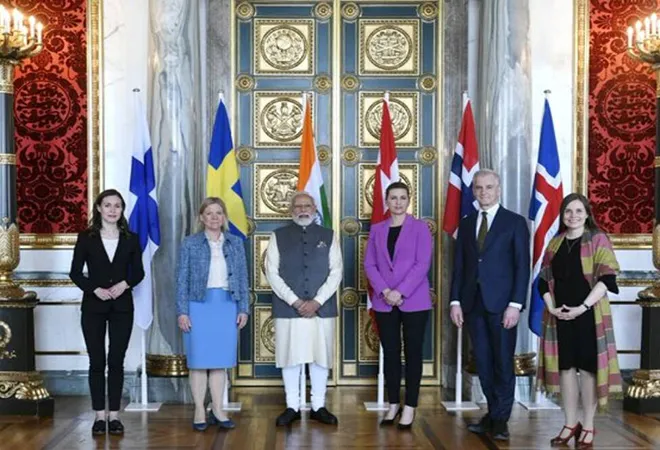
India and Nordic countries comprising Denmark, Norway, Sweden, Iceland, and Finland have embarked on a multidimensional strategic cooperation path in recent years based on mutual trust, enduring friendship, and a spirit of shared progress. The two sides are regarded as natural partners as they share strong democratic values and principles, pluralism, and institutional foundations. While the Nordic countries bring in the best of innovation, green technologies, clean energy, climate activism, and energy diversification, India is a fast-moving economic powerhouse, accounting for an impressive economic growth on a sustainable basis, a large pool of mineral resources, a vast market base of subcontinental dimension, highly resourceful talent pool, and a
stimulating innovation ecosystem. Keeping in perspective the extensiveness of India-Nordic convergence, it can be argued that such growing relations are paramount in raising the bilateral relations to new, strategic heights that could help address emerging geostrategic challenges, especially in the aftermath of the COVID-19 pandemic, rapidly changing geopolitical rift-lines in alliance formation, recent Afghanistan security concerns, and unfolding security and humanitarian concerns arising out of Ukraine conflict.
The second India–Nordic Summit held in May 2022 in-person format between Indian Prime Minister Narendra Modi and his Nordic counterparts provides the right kind of impetus towards further invigorating the ongoing collaborative dialogue to strategic heights. The Summit enabled the leaders to create a vision and roadmap for deepening partnership that caters to mutual requirements. Some of India’s flagship initiatives such as “
Make in India”, “Digital India”, “Start-up India”, and the Clean Ganga mission provide tremendous opportunities for Nordic countries to invest and participate in India actively. Heightened India–Nordic relations are also an enabling factor in promoting India's Arctic Policy which reflects New Delhi’s strong determination for strategic presence in that region. Concurrently, it will also enable consolidation of strategic ties with the European Union (EU) that is already gaining traction.
Heightened India–Nordic relations are also an enabling factor in promoting India's Arctic Policy which reflects New Delhi’s strong determination for strategic presence in that region.
Their strong commitment to establish rules-based international order, and support for enhanced efficacious functioning of multilateral institutions, especially in the aftermath of the COVID-19 saga while enhancing the
spirit of inclusiveness, transparency, and accountability of global governance to address emerging geopolitical challenges more effectively are steps in the right direction. In that context, the two sides have demonstrated strong determination to work in tandem towards reforming the United Nations Security Council (UNSC) in a quest to make it more inclusive, responsive, transparent, and effective. Importantly,
the robust trust, confidence, and resiliency of the growing partnership between India and Nordic countries can be assessed from the fact that the United States (US) is the only country other than India with which the Nordic countries have exclusive collaboration at the summit level. Currently, several Nordic multinational companies such as Volvo, Ericsson IKEA, Tetra Pak, Kone, Ahlstrom, Wartsila, and Nokia currently are fully operational in harnessing the vast Indian market base and simultaneously contributing substantively to India’s economic growth, technology partnership, and employment generation. Simultaneously, a
heightened collaboration between Nordic countries’ Smart Cities Project and India’s ambitious Smart Cities Project is unique in enhancing shared economic progress. Along similar lines, over the years, India’s investment in Nordic countries has also increased. Currently, there are over 70 Indian companies that are present in Sweden coupled with enhanced momentum of Indian companies making their presence in Denmark, Finland, and Norway, especially in the IT, automobile, and pharmaceutical sectors. Such reciprocal business and investment ties have been playing a profound role in lifting the growing partnership to strategic heights. Importantly, Nordic states’ growing interest in engagement under the ambits of the India–European Union Free Trade Agreement, expected to be successfully concluded in near future, promises to promote shared economic growth.
Enhanced cooperation on innovation and clean technology between India and Nordic states has been increasingly exhibited gaining traction in converging India’s rich talent base and digitalisation drive with Nordic states’ leadership in innovation and green technology transfer. A shared interest in enhancing investment in
“innovative and sustainable solutions” in conjunction with “identifying new opportunities in sectors such as food processing and agriculture, health projects and life sciences” have been prioritised.
Enhanced cooperation on innovation and clean technology between India and Nordic states has been increasingly exhibited gaining traction in converging India’s rich talent base and digitalisation drive with Nordic states’ leadership in innovation and green technology transfer.
On the twin issues of energy cooperation and climate action, India–Nordic relations are in synergy towards sustained green technology upgradation that ensures climate justice and provides impetus to renewable energy cooperation. India’s big push for exploration and exploitation of renewable energy makes perfect convergence of mutual interests aimed at strengthening scientific collaboration and investment ties. India and Nordic countries’ strong commitment to upholding and complying with the provisions of the Paris Agreement and advocacy for accelerated efforts toward climate action, reducing greenhouse gas emissions to permissible limits in the pursuit to combat global warming reflect convergences that provide vision and direction in shaping the new world order. Simultaneously, India–France-led International Solar Alliance is well endorsed by the Nordics with Sweden already a member and Norway’s recent decision to join the grouping. All such developments have strong future implications for climate action, clean energy cooperation, and working in concert in building robust new world order that effectively addresses pressing global challenges.
One of the unique features of the India–Nordic strategic partnership is the emphasis on maritime cooperation. Heightened investment in the blue economy aiming to enhance
shared economic progress, employment generation, nutrition, and food security is seen a s a positive step. India and Nordic states are surrounded by vast stretches of ocean waters. India’s emphasis to deepen maritime cooperation with the Nordics will offer tremendous scope for exchange of mutual expertise, enhance maritime security and trade initiatives, promote investment in ocean industries, and share common ocean heritage to each side’s advantage. According to the Joint Statement issued post- May 2022 India–Nordic Summit, the Prime Ministers deliberated on “
the potential of stimulating business cooperation and investments in sustainable ocean industries in India and the Nordic countries, including in the maritime, marine, and offshore wind sectors”. These are integral components of New Delhi’s strategic vision in foreign policy that intends expansion and greater activism in the maritime domain. Concurrently, greater maritime cooperation with the Nordics also allows for strengthening India’s Arctic Policy which entails a strategic vision towards harnessing natural resources optimally for sustainable development, clean technology transfer, innovation, and scientific experimentation. In that context, the two sides’ growing interest to partner in
transforming the shipping industry into a low carbon future is a step in the right direction.
Overall, India–Nordic strategic relations are based on strong foundations of democratic values, institutional affinities, people-to-people contact, pluralistic society, sustained security and trade cooperation, innovation, and climate justice. The heightened India–Nordic partnership has been increasingly recognised globally as a reckoning force towards strengthening the international rules-based system in the evolution of the 21
st-century world order.
The views expressed above belong to the author(s). ORF research and analyses now available on Telegram! Click here to access our curated content — blogs, longforms and interviews.



 India and Nordic countries comprising Denmark, Norway, Sweden, Iceland, and Finland have embarked on a multidimensional strategic cooperation path in recent years based on mutual trust, enduring friendship, and a spirit of shared progress. The two sides are regarded as natural partners as they share strong democratic values and principles, pluralism, and institutional foundations. While the Nordic countries bring in the best of innovation, green technologies, clean energy, climate activism, and energy diversification, India is a fast-moving economic powerhouse, accounting for an impressive economic growth on a sustainable basis, a large pool of mineral resources, a vast market base of subcontinental dimension, highly resourceful talent pool, and a
India and Nordic countries comprising Denmark, Norway, Sweden, Iceland, and Finland have embarked on a multidimensional strategic cooperation path in recent years based on mutual trust, enduring friendship, and a spirit of shared progress. The two sides are regarded as natural partners as they share strong democratic values and principles, pluralism, and institutional foundations. While the Nordic countries bring in the best of innovation, green technologies, clean energy, climate activism, and energy diversification, India is a fast-moving economic powerhouse, accounting for an impressive economic growth on a sustainable basis, a large pool of mineral resources, a vast market base of subcontinental dimension, highly resourceful talent pool, and a  PREV
PREV


